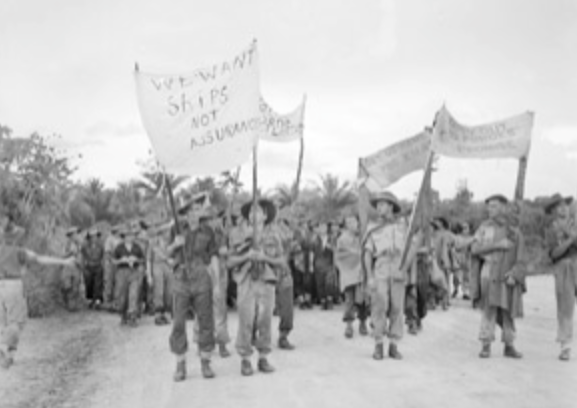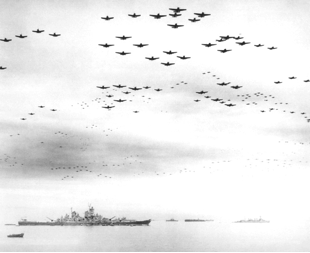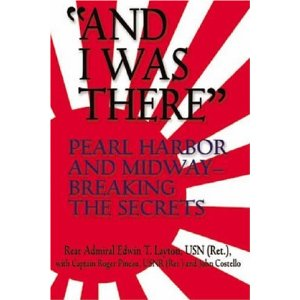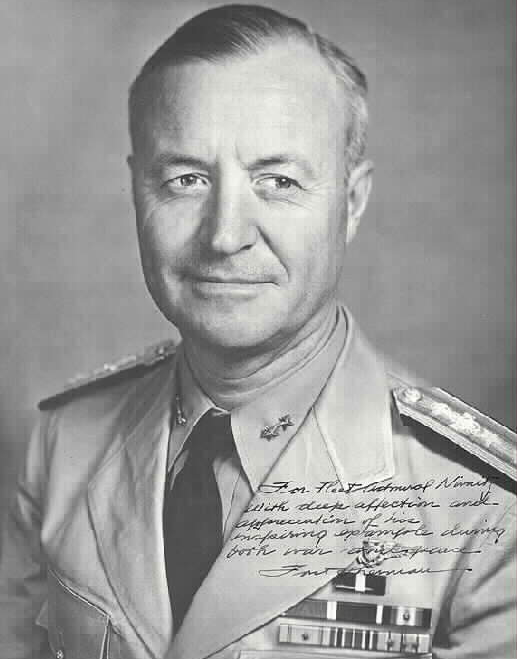R-Day
05 December 2016
Editor’s Note: Woke this morning at Refuge Farm. Delightful dawn, made me want to stay, and perhaps I will. The story below tells the story of what happened when it was over, and all the boys wanted to go home. It bridges Mac’s tale from what was to what was about to occur.
– Vic
R-Day

(Australian Troops protest their slow return home in the Philippines, Dec 1945. Australian War Memorial collections database)
I took a sip of the rich Willow coffee, and countered it a moment later with a smoky taste of Brandy. The pile of napkins in front of me mounted. The Good doctor was having one of the extraordinary a crème brulee for which the restaurant was known, while Mac was having just the water.
“Even the idea of coffee, decaf or not at this hour is going to keep me up.” I didn’t doubt him; he always has more energy than I do.
“Samuel Eliot Morison wrote a postlude to his big history of the war,” said the Doctor. “The one that got so many things wrong about why things happened the way they did, since he didn’t have a clearance. He said there were a remarkable number of postwar operations in the Pacific. Surrender of outlying Japanese garrisons, the occupation of course, minesweeping approaches to Japanese ports, and Operation Magic Carpet for the return of armed forces to the United States.”
“Yeah,” I said, gesturing with my pen. “You mentioned you had a lot of points. How did that work, and why didn’t you go home first? You had been in Hawaii since February of ’42.”
Mac smiled and took a sip of ice water. “One point per month of service; so I had over 50 points to start; I had been “overseas” for most of that, and each month counted for another point, and battle stars and decorations counted for more. Admiral Nimitz gave me a Bronze Star before he left command, and there is a citation for another one that I should have been awarded for the work we did to prepare for the battle at Midway. So, when you counted things up I was eligible to ride the Magic Carpet almost immediately. But of course we flew back to Pearl from the forward HQ at Guam.”
“The first ones to go on from there were those soldiers and sailors who were on furlough in CONUS when the war ended,” pronounced the Doctor. If they had more than 85 points, they were eligible for demobilization on the first R-Day.”
Mac folded his hands on the white tablecloth. “The War Department had begun to plan for this job long before D-Day.”
I swished some wine over my palette “I heard one time that the Navy went into the oval office to tell FDR that if the shipbuilding program continued as it was they would have 100 aircraft carriers in the Pacific, and the President told them to alter the plan.”
“I imagine so, but we didn’t know it was going to end.’
“Well, someone must have.”
“There was a fellow named Bill Tompkins, a Major General, who was in charge of the whole Magic Carpet thing. Apparently they waited until the day before the official announcement of R-day to inform the operational commanders what point total would make a servicemen eligible for release.
“They set it high at first, for the people in the European Theater, since they did not know how many troops would be required to conquer Japan. The Navy was specifically excepted from participating in the first flood of kids coming home after VE Day. The ships were needed to take the war to the enemy.”

(USS Missouri and the Surrender Fly-over. Offical US Navy Photo)
“Of course, with the surrender, the Navy jumped on things quickly. Magic Carpet featured every kind of ship in the Fleet. They welded bunks into everything, from aircraft carriers to battlewagons. New Mexico, Idaho, Mississippi, North Carolina and two carriers plus a squadron of destroyers filled with thousands of servicemen from every branch of the military headed east.
The flotilla stopped at Okinawa to pick up more from the 10th Army. Aircraft carriers being the most popular with the soldiers because their size made them more comfortable rides than a destroyer or one of Henry Kaiser’s Liberty Ships. The carriers were floating cities- they had had movies on the hangar decks, gyms, spacious lounges for officer and enlisted personnel, well-stocked ship’s stores, fresh food, hot meals and three-to five-tiered bunks were installed on the hangar decks to accommodate the troops.
“I just did an interview with another vet. He was younger than you. Bill McCullough didn’t have many points, since he just got to Saipan in November of ’44. They shipped him up to North Field at Guam for a while before they let him go. He was happy with traveling on an LST- a “Landing Ship Tank.”
“I imagine he was. I was back at Pearl then. Captain Layton had been called back to DC to testify in the Congressional investigation on who was responsible for the disaster at Pearl Harbor.”
“That was the one where they pinned the blame on Admiral Kimmel and General Short?”
“Oh yeah.” Mac scowled. “Never forget: Washington is always right. Joe Rochefort had been put in for the Distinguished Service Medal for figuring out the Japanese were going to attack Midway, the OPINTEL that allowed Admiral Nimitz to bushwack them and sink four carriers and a heavy cruiser. I broke the back of the Imperial Fleet only six months after the attack on Pearl. Washington thought the attack would be on Dutch Harbor in Alaska. Joe Rochefort was right, and the Redman Brothers were wrong.”
“They really were bastards, weren’t they?”
“Don’t get me started. They managed to get Admiral Stark’s Chief of Staff Joe Horne to not only deny Rochefort the DSM, but award one to Joe Redman. He got himself promoted to Rear Admiral, too, and his younger brother John to Captain, early. Admiral Horne was an ambitious son of a bitch. Admiral King never trusted him, even if he basically ran the Navy during the war.”
“Didn’t they force Rochefort out of Hawaii, too?”
“They forced him out of intelligence. They claimed Joe had missed signs of the attack on Pearl, and only Washington had everything right. By the time they were done, the most gifted code-breaker and Japanese linguist the Navy ever had finished the war as the commissioning commander of a floating drydock.”
I shook my head in wonder at that. “Didn’t you finally help set the record straight?”
Mac nodded. “President Reagan awarded Joe Rochefort the DSM in 1984. Unfortunately, it was posthumous. But Joe’s kids were there to see it.”
“I read Captain Layton’s book. He really savages those assholes. But the damage was done, right?”

“Yes. Layton made admiral, but he dragged his feet at printing his story of the war. So much of it was highly classified. His book “And I was there” didn’t come out until 1985, and that was posthumous, too.”
“I still can’t believe it was a drydock they forced him to. I imagine that ensured he would never get any recognition for the rest of the war. That was probably the only kind of ship that didn’t help bring the troops home.”
“True. It was quite remarkable. The Truman Administration could not stand the public and bipartisan Congressional outcry to bring the boys home. There were demonstrations by troops in Europe and the Philippines by the end of the year. Only a dust-up overseas could have stopped the flood going home, and it didn’t happen. The Japanese efficiently disarmed themselves. December of ’45 was the biggest month for the Magic Carpet.”
The Doc furrowed his brow as he sat across the apex of the Amen Corner. “As I recall, nearly 700,000 servicemen came home that month alone. It was like someone had pulled the handle on a toilet to drain the tank. The American armed forces shrank from about twelve million in June of ’45 to one-and-a-half million two years later. It would have a dramatic effect in the Pacific. By 1950, the North Koreans calculated they could push what was left of the American presence into the sea before we could respond.”
”My Mom still talks about the boys from her hometown coming back through New York. The one thing she was not going to do was the same thing. She was not going to go back to the Ohio River Valley. The war set her free.”
“It certainly did change things for a lot of people. But it was going to change again. Congress had passed a law that everyone who left a job to join the service would have that job waiting when they got home.”
“So, with your high point total, why didn’t you go home?”
Mac reached in his pocket for his wallet, I reached for mine and the Good Doctor reached for his, looking for all the world like a three-way Mexican stand-off.
.
“I told you everyone had a job to go back to, guaranteed by law. I had a bit of a problem. I had joined the Navy right out of the University of Iowa. I was one of the few people on the staff who had nothing to go home to.”
I won’t tell you who won the check, since you can probably guess. And I don’t need to tell you that what happened next, after serving under three revolving-door Fleet Intelligence Officers, Mac found himself on a boondoggle back to Washington in 1946, the new center of the universe.
Remember, he was a deck officer who had never served on a ship, and the future looked limited. After the Wahoo was sunk with all hands, he had decided the submarines were not for him. He was trying to figure out what the future might hold as he walked down the passageway of the third deck of old Main Navy by the Reflecting Pool on the Mall.

(ADMIRAL Forrest Sherman 1947. Official Navy Photo)
It was all luck again. He happened to see lean and energetic Admiral Forrest Sherman coming the other way, and the Admiral remembered Mac well from their days together on Guam, and greeted him warmly.
The Admiral put his arm around Mac, and said “I am concerned about all my Air Intelligence Officers. Most of the ones I recruited were lawyers, and with the war over, they have all gone back to civilian life. I need to start a cadre of intelligence professionals for this new world. We need to keep you, Mac. There is a selection board meeting right now to pick the first batch.”
Mac looked at him, curious.
“Here is what I want you to do. Take thirty days leave and go back to Iowa. Then you come back here and contact my EA Captain Espey. He will tell you what to do.”
Mac shook his hand. It was the last time he would see the Admiral in person, but it was just enough to determine the course of the rest of his life.
Copyright 2007 Vic Socotra
www.vicsocotra.com
